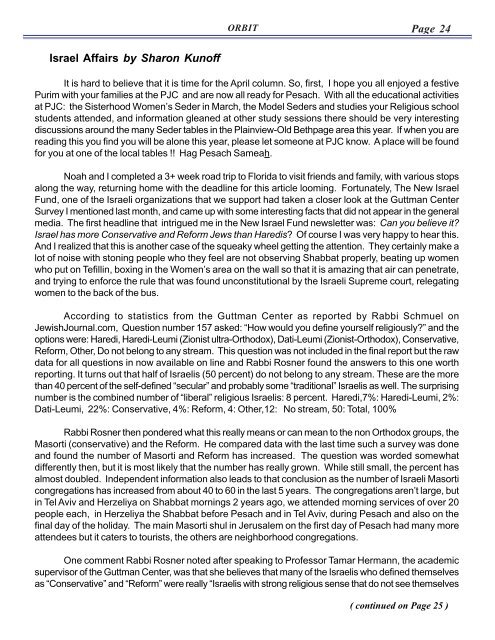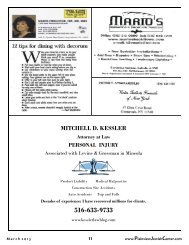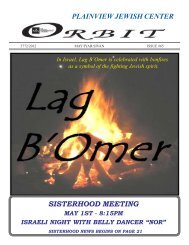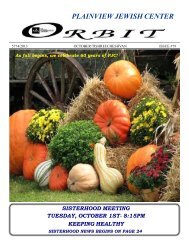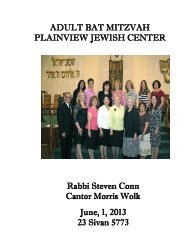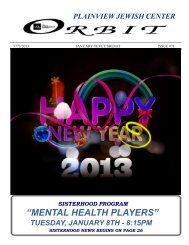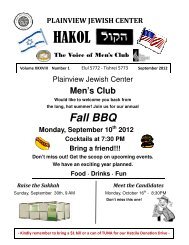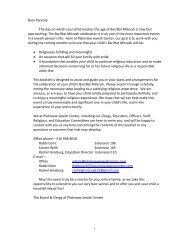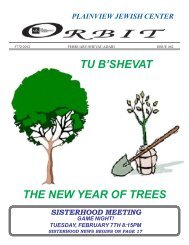Orbit April 2012 - Plainview Jewish Center
Orbit April 2012 - Plainview Jewish Center
Orbit April 2012 - Plainview Jewish Center
Create successful ePaper yourself
Turn your PDF publications into a flip-book with our unique Google optimized e-Paper software.
ORBIT<br />
Page 24<br />
Israel Affairs by Sharon Kunoff<br />
It is hard to believe that it is time for the <strong>April</strong> column. So, first, I hope you all enjoyed a festive<br />
Purim with your families at the PJC and are now all ready for Pesach. With all the educational activities<br />
at PJC: the Sisterhood Women’s Seder in March, the Model Seders and studies your Religious school<br />
students attended, and information gleaned at other study sessions there should be very interesting<br />
discussions around the many Seder tables in the <strong>Plainview</strong>-Old Bethpage area this year. If when you are<br />
reading this you find you will be alone this year, please let someone at PJC know. A place will be found<br />
for you at one of the local tables !! Hag Pesach Sameah.<br />
Noah and I completed a 3+ week road trip to Florida to visit friends and family, with various stops<br />
along the way, returning home with the deadline for this article looming. Fortunately, The New Israel<br />
Fund, one of the Israeli organizations that we support had taken a closer look at the Guttman <strong>Center</strong><br />
Survey I mentioned last month, and came up with some interesting facts that did not appear in the general<br />
media. The first headline that intrigued me in the New Israel Fund newsletter was: Can you believe it?<br />
Israel has more Conservative and Reform Jews than Haredis? Of course I was very happy to hear this.<br />
And I realized that this is another case of the squeaky wheel getting the attention. They certainly make a<br />
lot of noise with stoning people who they feel are not observing Shabbat properly, beating up women<br />
who put on Tefillin, boxing in the Women’s area on the wall so that it is amazing that air can penetrate,<br />
and trying to enforce the rule that was found unconstitutional by the Israeli Supreme court, relegating<br />
women to the back of the bus.<br />
According to statistics from the Guttman <strong>Center</strong> as reported by Rabbi Schmuel on<br />
<strong>Jewish</strong>Journal.com, Question number 157 asked: “How would you define yourself religiously?” and the<br />
options were: Haredi, Haredi-Leumi (Zionist ultra-Orthodox), Dati-Leumi (Zionist-Orthodox), Conservative,<br />
Reform, Other, Do not belong to any stream. This question was not included in the final report but the raw<br />
data for all questions in now available on line and Rabbi Rosner found the answers to this one worth<br />
reporting. It turns out that half of Israelis (50 percent) do not belong to any stream. These are the more<br />
than 40 percent of the self-defined “secular” and probably some “traditional” Israelis as well. The surprising<br />
number is the combined number of “liberal” religious Israelis: 8 percent. Haredi,7%: Haredi-Leumi, 2%:<br />
Dati-Leumi, 22%: Conservative, 4%: Reform, 4: Other,12: No stream, 50: Total, 100%<br />
Rabbi Rosner then pondered what this really means or can mean to the non Orthodox groups, the<br />
Masorti (conservative) and the Reform. He compared data with the last time such a survey was done<br />
and found the number of Masorti and Reform has increased. The question was worded somewhat<br />
differently then, but it is most likely that the number has really grown. While still small, the percent has<br />
almost doubled. Independent information also leads to that conclusion as the number of Israeli Masorti<br />
congregations has increased from about 40 to 60 in the last 5 years. The congregations aren’t large, but<br />
in Tel Aviv and Herzeliya on Shabbat mornings 2 years ago, we attended morning services of over 20<br />
people each, in Herzeliya the Shabbat before Pesach and in Tel Aviv, during Pesach and also on the<br />
final day of the holiday. The main Masorti shul in Jerusalem on the first day of Pesach had many more<br />
attendees but it caters to tourists, the others are neighborhood congregations.<br />
One comment Rabbi Rosner noted after speaking to Professor Tamar Hermann, the academic<br />
supervisor of the Guttman <strong>Center</strong>, was that she believes that many of the Israelis who defined themselves<br />
as “Conservative” and “Reform” were really “Israelis with strong religious sense that do not see themselves<br />
( continued on Page 25 )


